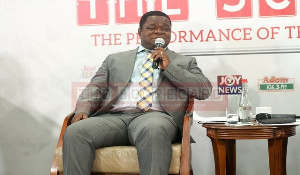- Home - News
- Polls
- Year In Review
- News Archive
- Crime & Punishment
- Politics
- Regional
- Editorial
- Health
- Ghanaians Abroad
- Tabloid
- Africa
- Religion
- Election 2020
- Coronavirus
- Photo Archives
- News Headlines
- Press Release
General News of Monday, 4 November 2019
Source: thebftonline.com
Terminating PDS deal makes economic sense – Prof. Quartey
Director of the Institute of Statistical, Social and Economic Research (ISSER) at the University of Ghana, Professor Peter Quartey, has backed government in terminating the deal between the Electricity Company of Ghana (ECG) and Power Distribution Service (PDS), saying it is economically right.
Government, a few weeks ago, terminated the concession agreement between the ECG and PDS after it uncovered issues which defy the sanity and fidelity of the contract, when it established that the PDS provided a forged Demand Guarantee as security for the contract.
The termination of the PDS deal, however, did not sit well with the US government; and as a result it withheld the US$190million grant for the concession – arguing that the termination was unwarranted based on revelations of the forensic investigation into the matter.
Despite acknowledging that withdrawal of the grant will obviously impact negatively on restructuring of the energy sector, the economics professor says government made a decision that was economically prudent.
“If truly there was no guarantee; if the insurance was not valid, then as a country we cannot give our national asset to a foreign entity without any guarantee or cover. If what I am hearing is true, then I think I support government’s position.
“It is right economically. In the long-term, how much is PDS going to raise over the 20-year period? Let’s estimate that. If we are going to lose so much as a result of their presence and already they are starting on such a bad footing, then I think we should be cautious about our comments. I trust that government will seek the national interest, and therefore I give government the benefit of the doubt. I would not rather support a foreign company against my country,” he told the B&FT in an interview.
Prof. Quartey however advised that any future deal regarding selecting another concessionaire should be transparent, as much as possible, in order to avoid running into similar problems; and also to get the best deal that will better restructure the country’s energy sector.
“Going forward, let’s be transparent with our selection process. I believe there were things other companies were unhappy about, and that’s why they left. So, let’s review those kinds of things again; bring them back to the table and let’s get the best deal out of it. If this deal is done in a very transparent manner, we will get the best out of it,” he said.
Government has backtracked on its initial stance of using restrictive tendering to select a new concessionaire after the opposition NDC and energy experts vehemently opposed the idea.
Entertainment










